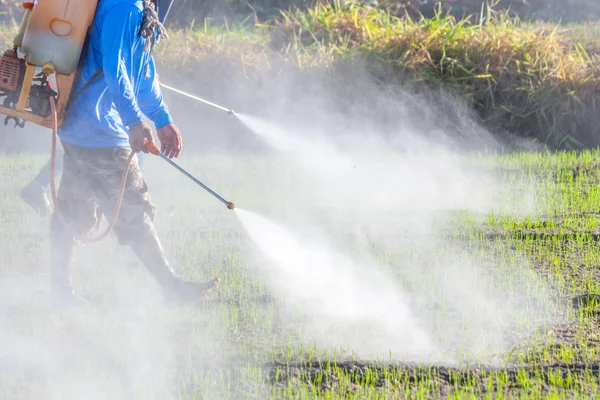A new study confirms Pesticides Can Reduce Sperm Counts. It appears that exposure to common pesticides may contribute to declining sperm counts in men.
Scientists have long been puzzled by the steady decline in sperm counts observed over the past half-century. While various factors, including cell phone usage, nutrition, and lifestyle choices, have been implicated, a new study sheds light on the potential role of pesticides in this worrying trend.

Study Confirms Pesticides May Reduce Sperm Counts
Researchers from George Mason University and Northeastern University conducted a comprehensive analysis of 20 studies involving over 1,700 men. They found that higher exposure to organophosphates and N-methyl carbamates, two types of widely used pesticides, was associated with lower sperm concentrations. This association was particularly strong among men who were exposed to these chemicals through their work.
While the study cannot definitively establish a causal link between pesticide exposure and low sperm counts, the findings raise concerns about the potential impact of these chemicals on male fertility. The researchers emphasize the need for further research to fully understand the relationship between pesticides and reproductive health.
In the meantime, men who are concerned about their sperm count can take steps to reduce their exposure to pesticides, such as:
-
Prioritizing the consumption of organic produce whenever possible. Organic produce is grown without the use of synthetic pesticides, herbicides, or fertilizers, which can have harmful effects on human health.
-
Avoiding the use of pesticides in their homes and gardens. There are many natural and organic alternatives to pesticides that can be used to control pests in the home and garden.
-
Choosing personal care products that are free of pesticides and other harmful chemicals. Many personal care products contain pesticides and other chemicals that can be harmful to human health. Look for products that are labeled as “organic” or “natural.”
-
Wearing tight clothing or taking hot baths can impact sperm counts because the testicles need to be slightly cooler than a person’s core body temperature for optimal sperm production.
List of sperm-boosting foods
Here’s a list of foods that may help boost sperm count and improve sperm quality:
-
Oysters: Rich in zinc, which is essential for sperm production and motility.
-
Fatty fish: Like salmon, mackerel, and sardines, are good sources of omega-3 fatty acids, which are important for sperm health.
-
Dark chocolate: Contains antioxidants that may protect sperm from damage.
-
Walnuts: Rich in omega-3 fatty acids and vitamin E, which are beneficial for sperm health.
-
Fruits and vegetables: Particularly those rich in antioxidants, such as berries, spinach, and kale.
-
Eggs: A good source of protein, vitamin D, and zinc, all of which are important for sperm health.
-
Whole grains: Provide essential nutrients, including vitamin B9 (folate), which may help prevent sperm DNA damage.
-
Maca root: A Peruvian plant that has been traditionally used to improve fertility. Some studies suggest it may increase sperm count and motility.
-
Fenugreek: An herb that has been shown to increase testosterone levels and sperm count in some studies.
READ RELATED: 6 Once-Largest American Restaurant Chains That Went Out of Business
-
Ashwagandha: Another herb that may improve sperm count and motility.
It’s important to note that the evidence for the effectiveness of these foods is mixed, and more research is needed to confirm their benefits. However, incorporating these foods into a healthy diet may provide overall health benefits and potentially support sperm health.
Tips for improving sperm count and quality
Lifestyle factors:
-
Maintain a healthy weight: Obesity has been linked to lower sperm count and quality. Aim for a healthy body mass index (BMI) of between 18.5 and 24.9.
-
Eat a healthy diet: A balanced diet rich in fruits, vegetables, whole grains, nuts and lean protein can provide the nutrients your body needs to produce healthy sperm.
-
Limit exposure to toxins: Avoid exposure to pesticides, heavy metals, and other environmental toxins that can damage sperm.
-
Manage stress: Chronic stress can lower sperm count and quality. Find healthy ways to manage stress, such as exercise, yoga, or meditation.
-
Get enough sleep: Aim for 7-8 hours of sleep per night. Sleep deprivation can disrupt hormone production and sperm health.
-
Exercise regularly: Regular exercise can improve overall health and may also benefit sperm health.
-
Avoid smoking and excessive alcohol consumption: Smoking and excessive alcohol consumption can damage sperm.
Supplements:
-
Consider taking a multivitamin: A multivitamin can provide essential nutrients that may be beneficial for sperm health.
-
Take folic acid: Folic acid is important for preventing sperm DNA damage. Aim for 400 micrograms of folic acid per day.
-
Consider taking omega-3 fatty acids: Omega-3 fatty acids may improve sperm motility and morphology. Aim for 500-1,000 milligrams of omega-3 fatty acids per day.
-
Consider taking zinc: Zinc is essential for sperm production. Aim for 11 milligrams of zinc per day.
-
Consider taking vitamin C: Vitamin C is an antioxidant that may protect sperm from damage. Aim for 90 milligrams of vitamin C per day.
Other considerations:
-
Keep the testicles cool: The testicles need to be slightly cooler than a person’s core body temperature for optimal sperm production. Avoid wearing tight-fitting underwear or sitting for long periods of time.
-
Avoid hot tubs and saunas: Hot tubs and saunas can raise scrotal temperature and impair sperm production.
-
Get regular medical check-ups: Underlying medical conditions, such as infections or hormonal imbalances, can affect sperm count and quality. See your doctor for regular check-ups and to discuss any concerns you may have.







